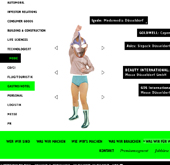Part three of our five-part series on international copywriting.
An adaptation agency provides a level of service that differs from the straightforward service you tend to expect from a translation services company. Below, find out exactly what makes the difference.

|
What’s advertising sans frontieres?
We wish we had been the ones to coin that phrase, but it most likely was first used by Mike Münch of Germany’s top adaptation agency, Burton · Münch & Partner World Wide Writers (BMPwriters), specialists in creative translation copywriting that goes the extra mile.
An adaptation agency is like a translation agency cross-bred with an ad agency + branding consultancy + copywriting firm. Think high end, high quality service (and really nice offices). BMPwriters’ clients are advertising and PR agencies that need BMPwriters’ help to give clients “a compelling voice internationally.” If you have a multilingual ad campaign that has to be rendered pitch-perfect and culturally savvy in different international markets, and you have the budget to invest in top quality service, consider going with an adaptation agency. They’ll guide you smoothly through the entire process.
Adaptation agencies are designed to offer full-on consulting. They’re prepared to take their time working with clients in a more intimate way than you’ll find at ordinary, volume-oriented translation agencies, explains Mike, a friend of ours and co-founder of BMPwriters. Working with advertising, public and investor relations agencies as well as marketers going global, BMPwriters has built up substantial adaptive copywriting and consulting expertise.
“Adaptation agencies close the gap between translation and copywriting,” considered Mike during a recent phone conversation…
It’s all about readjusting and fine-tuning the original message so it can perfectly home in on the target group, which is always a critical balancing act. On the one hand, the adaptation must reflect the marketer’s agreed tone of voice, corporate wording, etc.; on the other, it has to satisfy the target market’s linguistic, cultural and psychological requirements to come across as powerful, hard-hitting copy. We also look into differences in the competitive situation on the home vs. the target market and take other critical factors into account. The adjustment may range from finding or creating a play on words that works and adds currency to the marketer’s message, to rewriting text that is perceived as tongue-in-cheek in the original message but might strike the wrong chord or be politically incorrect outside the home market. In other words, it’s a results-driven approach for high-impact messages in advertising, public and investor relations as well as executive communications.
By contrast, most translation services companies are set up to take the usual translation orders for the vast majority of documents that merely describe, inform or explain things. Experience trains conventional translators to take a conservative/prosaic approach to text. They normally aren’t given to taking a bold/poetic approach. Most can, but won’t get creative unless the project manager specifically asks for it. Nothing wrong with that. And this is not to disrespect the work of translators. As translator David Stormer noted in a comment to one of our recent blog posts, quality translation involves “the creativity and discipline of professionals specialized in making the foreign sound familiar and the incomprehensible clear.”
Adaptation of copy differs from translation in that with adaptation it doesn’t particularly matter what the copy says. What matters is what the copy does. Much of ordinary communication is meant to explain, guide, inform, not necessarily to call the reader/listener to action or meld a brand ever more deeply into the subconscious. Copywriting is not ordinary communication.
Our own agency (JAPANtranslation) is one of those that deals mostly with standard texts – i.e., ordinary documents that describe, inform or explain – though we also offer persuasive Japanese copywriting services. In fact, we work with adaptation agencies on projects to provide additional insight and consulting. An adaptation company vs. a translation company boils down to a different business model (and price point). If you’re dealing with a more general translation agency (such as ours), you can still get high-quality results, but you need to be prepared (more tips coming soon!) and you may need to provide more overall direction rather than just hand the work off to a vendor and hope for the best. We’ll be posting more on this topic in early May.
Have we left out any important points about adaptation companies cf. translation services companies? Comments are very welcome! (Scroll down to add your comment.)
About the authors
- Lawrence LaFerla is the division head for JAPANtranslation and blogger in chief at “Marketing on the Japanese web.” He works in sunny Osaka.
- Hannah Smalltree is the senior editor of SearchDataManagement.com, an online technology publication, and freelance copywriter, based in Massachusetts.

I enjoy seeing the topic of translation. I have just made a translation widget to help people read sites from other languages into their native language. The first comment I receive back was that I need to write a post explaining that the tool is fine if you are translating into your own language to read, but it is a danger to use it as a tool to translate into other languages.
I’ll have that post done today, I hope!
Lawrence’s new personal page… http://lawrencelafer.la/